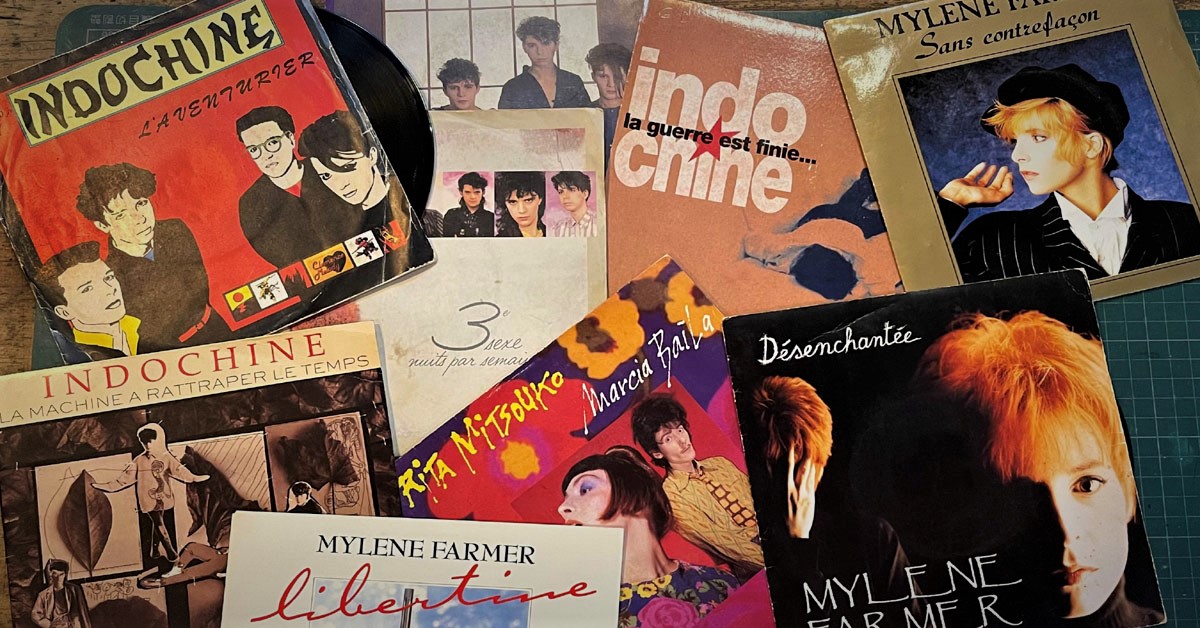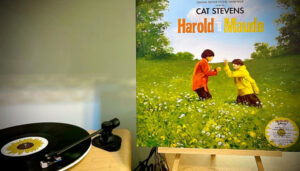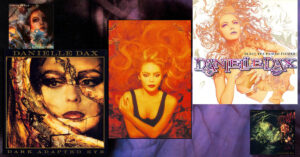Growing up in a multilingual neighbourhood, I was constantly exposed to music from around the world, sung in different languages. Of course, since I lived in Montreal, the vast majority of the music that I heard was either English or French. As a child, and as a young man, I really didn’t care much for any music that wasn’t sung in English. I suppose, it was the ignorance of youth that made me uninterested in expanding my horizons. I wasn’t really until I started working in a record store, however, that I actually had the opportunity to discover some French music that I really, really liked enough to buy it and support the artist. It wasn’t until I started living in Asia that I discovered music sung in Chinese, Japanese, Korean and Thai. Being away from home allowed me to discover that I enjoyed the music despite the occasional language barrier. I’ve even discovered some music in Spanish, German, and Portuguese that I would never have explored had I still been living in North America..
Indochine and Mylène Farmer are a couple of French artists whose career I follow to this day. Yumi Matsutoya and Asian Kung-Fu Generation are Japanese artists that I love and excitedly await new releases from! I even discovered the wonderfully subversive Secos & Molhados from Brazil, though their albums are proving difficult to obtain for a fair price.
I was first introduced to Mylène Farmer in or around 1992 while working at HMV records in downtown Montreal. At the time, she had just released a double CD of dance remixes titled (predictably) “Dance Remixes”. At the time I wasn’t really bothered one way or another by her music. It wasn’t until I was asked (inexplicably) to take charge of the French Music section at the store for a few weeks. I say “inexplicably” because I was probably the only person on the entire staff whose first language was not French, and as such, I had the least knowledge of the music I was asked to curate and sell. I was a very odd choice to man this station, but I enjoyed the experience and discovered some great, (and not-so-great), music. I won’t mention any of the not-so-great stuff here.
During my time in the French Music section, I had a crash course on the artists and sounds coming out of the French speaking world. I wasn’t terribly thrilled with most of it, to be honest. A lot of what was considered hot sellers was the French equivalent of the Carpenters (ie: pretty enough, but bland). I also felt that a lot of the more modern releases also sounded straight out of a time warp. Although I have gained an appreciation since, at the time I was struck with how a lot of the then-modern French music sounded slightly behind-the-curve vis-a-vis the current English fashion (a lot of the then-current 90s artists sounded like they were still making records in the 70s). There were a couple of exceptions, of course. I discovered some bands that were whole universes in and of themselves; doing their own thing and to hell with current trends. These tend to be the bands that I find myself still listening to some thirty years later: Indochine, Mylène Farmer, Beau Dommage, Harmonium, Etienne Daho, Stephan Eicher, and Layman Twaiste. A few more modern artists that have some music that thrills me include Black M (check out the sublime On Fait du Mal), and Stromae (check out the phenominal Papaoutai), Lisa LeBlanc‘s hysterical “Chiaque Disco” album is a great blast of 70s infused disco that is purposefully retro, and of course the ridiculous, but awesome, Bleu Jeans Bleu and their massive French language comedy hit Coton Ouaté.
Of all the French music that I have heard over the years though, only two artists in particular really stuck with me: Indochine and Mylène Farmer.
Taking her stage name from the famous American Actress Frances Farmer, Mylène Farmer has said that her influences include Greta Garbo, Jacques Brel, Kate Bush and Depeche Mode.
I have heard Mylène Farmer described as the French Madonna, but a closer look reveals a number of differences. The similarities are rather obvious: she often does dance-floor ready pop music, she is a strong business woman and handles all of her affairs personally, her music and her image is extremely sexual, and she sells out stadiums every time she tours. In fact, she is the only French artist to have scored a number 1 in four consecutive decades. Like Madonna, she also changes her musical styles every few years, having gone from dark synth pop to rock-flavoured R&B, to electronica, and back to pop during the course of her career. The only real constant is her trademark red hair (though, she did opt for shocking white hair and red eyes on the cover of 2012’s “Monkey Me”). But I think the comparison ends there.
Despite these similarities, there are some major differences. Although, like Madonna, her public persona is extremely sexual (she has often appeared semi-nude or topless in her music videos, which is not considered shocking or vulgar by French standards), her image and lyrics are generally classy as opposed to vulgar: sex is simply a part of life and it’s great. Her music videos are often extremely artistic mini-films shot in widescreen (some lasting as long as 15 or 20 minutes!). Does she use sex to sell a product? Absolutely! But, as I said: it’s done in a way that comes across as simply natural as opposed to filthy. Her publicity images and music videos are usually sexy, but often gothic and macabre.
Her lyrics are generally quite thought provoking as well; extremely literate, using precisely the right words often involving alliteration and double entendres; rarely dumbing themselves down for her audience, whom she expects to keep up. Often poetic and full of religious imagery, her lyrics explore themes of sex, death, love, forbidden desires, philosophy, and existentialism. She is an intellectual, but not a snob about it. Her writing is heavily influenced by Beaudelaire, Edgar Allan Poe, Pierre Reverdy, and Kierkegaard. In this regard I think it would be more fair to say she has more in common with Kate Bush than Madonna.
She is also an extremely private person. Since a stalking incident resulted in the death of an employee at her record company in 1991, she has remained mostly out of the public eye when she isn’t performing; rarely giving interviews or personal appearances outside of concerts.
Since I was first introduced to her in 1992, I have kept up with her career, always buying any new albums I came across, knowing that they wouldn’t disappoint. Since the mid 2010s, I have pre-ordered each of her new releases as soon as they were announced, looking forward to each new album and the surprise direction it will take.
Without question, my favourite recent Mylène Farmer albums are “Point de Suture” (2008), which blew me away (though I hate the duet she does with Moby, Looking for my Name), “Bleu Noir” (2011) which switched gears to a more pop-orientyed sound (less dance floor) and never fails to make me smile from start to finish, and “Monkey Me” (2012) which returned to floor thumpers and again blew me away (with only one weak track IMHO!).
If you’re interested in exploring Mylène Farmer on your own, in more depth than the playlist below, those are great albums to start with. All released in the twenty-first century.
If you want to check out some of her twentieth century offerings, I also highly recommend “L’Autre” (1991) and “Anamorphosée” (1995) and “Innamoramento” (1999). For a REALLY retro vibe check out “Ainsi Soit Je…” from 1988. Yes… she’s been around forever.
Her amazing Greatest Hits collection “Les Mots” from 2001 features a duet with Seal (the title track), and is also a great place to start. Her second collection of hits, simply titled “2001-2011” will also get you up and moving. Both are difficult to track down on vinyl, but worth the effort.
Her latest collection, “Histoires de…“, was released in 2020 on 6 LPs or 3CDs and contains live versions of her earlier singles, as well as all of her latest hits. But to be honest, most of her twenty-first century offerings are so strong that it’s worth just grabbing them each individually, especially if (like me) you’re not that into live performances of greatest hits. Buying the individual albums will likely cost you less, too. The only ones I wouldn’t recommend to a casual fan are her latest 2: 2015’s “Interstellaires” (despite the fact that it features Stolen Car, a duet with Sting) or 2018’s “Désobéissance” which, aside from a couple of cool songs, just hasn’t grown on me yet, despite being released over 4 years ago.
Indochine is a band that I also discovered in 1992, and I had the good fortune to not only meet them during an in-store autograph signing session, but to see them perform at a fairly small club in Montreal. At that point, I wasn’t sure if I really liked them or not, but the music really grew on me. I’m not actually a huge one for live music, to be honest, but that concert was a great night out, and remains one of my favourite concert-going experiences ever. They were in town to promote their fantastic 1991 collection “Le Birthday Album”. This was a great chance for me to discover the band because they were touring in support of a greatest hits collection. As a result, I got to hear all their best known songs and discover what all the fuss was about.
Once I realized that I liked 99% of the songs on “Le Birthday Album” it was only a matter of time before I started buying up their back catalogue on CD. Of course, I have now replaced all those CDs with vinyl, with the disappointing exception of “Le Birthday Album” which was never issued on vinyl for some reason, despite having exclusive versions of the majority of the songs on the collection.
Indochine is another band who definitely deserves a deep dive, as they say. They started out in 1981 as an up and coming New Wave band, releasing their first mini-album “L’Aventurier” in 1982. which exploded out of the gates in the French speaking world (and… for some odd reason… Scandinavia). The title track is often cited as “the song of the summer 1982” in France. Apparently, its blend of jerky, poppy guitars and half-sung, half-shouted lyrics arrived at just the right moment.
Three more quirky new-wave infused albums followed, each one outselling the one before. By 1990, the whole New Wave movement had essentially died-out in most of the world, but Indochine not only kept their fans, they shifted direction just enough to remain relevant and musically interesting. Their 1990 album “Le Baiser” is quite a departure from their previous effort musically and stylistically, and marks the departure of original founding member, saxophonist Dimitri Bosianski.
The release of the aforementioned “Le Birthday Album” in 1991 became another turning point for the band, however, when it seemed to the last hurrah for their massive popularity. I remember buying the 1993 album “Un Jour Dans Notre Vie”, and despite that fact that I didn’t actually dislike it (it features some gorgeous tracks!) I never really got into it, and I may have only ever played the CD a handful of times. It seems like I wasn’t alone in abandoning them at this point.
The 1990s were a decade of critically well received albums that, despite great reviews, they couldn’t give away for free. It was only at the dawn of the new century that something shifted again. Guitarist, keyboardist and founding member Stéphane Sirkis died in 1999 due to hepatitis, leaving his twin brother, vocalist Nicola Sirkis, and keyboardist Dominique Nicolas as the only surviving members of the original band. With firm instructions from Stéphane that they should continue without him, the band once again changed directions.
Taking inspiration from darker, introspective artists such as Nine Inch Nails, Marilyn Manson, and Placebo, but still maintaining a more pop aesthetic, they released what could only be described as their comeback album, “Paradize” in 2002. Their following album, “Alice & June” featured guest vocals from Placebo front man Brian Molko and was also a huge success.
It was around this time I started getting back into vinyl, and some of the earlier albums from Indochine were on my wishlist of albums I wanted in my record collection on vinyl. Lucky for me, BMG France began reissuing Indochine‘s complete studio discography on 180gr vinyl. I snapped them up, in the process discovering (and really enjoying) a couple of albums that I had missed in the 1990s (1996’s “Wax” and 1999’s “Dancetaria”).
I also discovered an absolutely gorgeous live album, recorded at the Hanoi Opera, that was released in 2007! Simply titled “Hanoi”, the album is a fantastic hybrid of straightforward rocking interpretations of their songs, accompanied by the full Hanoi Philharmonic Orchestra, which works to create some astonishing interpretations of old favourites.
A small handful of exceptional albums have followed since then, the gorgeous “La République des Meteors” in 2009, “Black City Parade” in 2013, and the brilliant “13” in 2017.
I am someone who believes in the law of diminishing returns as it applies to bands that keep chugging along year-after-year releasing album-after-album. Usually, by the time a band releases their 8th, 9th, or 10th albums, they haven’t got anything new to say and have very little new musical territory to explore. Of course, this isn’t always a bad thing (thank god AC/DC never tried anything new…. they’re perfect as-is, thank you very much) but sometimes it can cause a band’s later output to sound stale and irrelevant (does anyone actually think “In Through The Out Door” is a good album from start to finish?). I am pleased to discover that Indochine has somehow evaded this trap.
Trying to decide on my favourite albums by Indochine is a tough call! If I had to choose which ones I couldn’t live without, or that I highly recommend to someone new to the band, I would have to say 1989’s “Le Baiser” (which, like most of their early albums, is not available on Spotify), 2013’s “Black City Parade” and 2017’s “13” because those albums are great from start to finish. Most of their early 80s albums have an awesome “new wave” charm; a lot of songs are great, and fit together stylistically, but aside from the singles, they’re weaker collections than Indochine‘s later output.
I would also really recommed 2007’s “Hanoi” because of the arrangements (also not available oin Spotify, and well worth tracking down), and finally, as an introduction to the bands earlier material, I’d also add 1991’s “Le Birthday Album” compilation because, with the exception of perhaps 2 or 3 songs, it has all the best from the early albums, and features exceptional single edits.
Last but not least in today’s marathon introduction to French pop, I want to introduce you to band from Montreal, Laymen Twaist, whose debut album, “A Lombre du Lis” is among my favourites. When it came out, it sounded like absolutely nothing else in the French music community. It still doesn’t! They have a great late 80s/early 90s alternative electro pop sound on this album and there isn’t a bad song on it! I can’t say the same about their other albums, but this one has been a life-long favourite of mine.
A lot of their other releases veered more towards hip hop, which I’m not too big on, but this album doesn’t. I remember when it first came out that a lot of people (including myself) felt that had a lot of elements that were bit reminiscent of New Order, Depeche Mode, and The Icicle Works without actually sounding like any of them! In that regard it’s a pretty unique French language album. It was one of those CDs that I would happily put on repeat when I was working in the French music section, and to this day I can gladly listen to it from start to finish without skipping any tracks: singer and bassist Jean-François Aubé‘s deep smooth vocals just ooze sensuality, and his accent is delicious, haha!
At the time of this album’s release, the band was a trio with two keyboardists: Paul Dubé, and rapper Stanley Hilaire who provided lead vocals on many of their other releases, though not on this one.
I had originally wanted to include a couple of songs from this album in the playlist below, but sadly, “A Lombre du Lis” is not available on Spotify for some reason. If you ever find a copy of that album, just buy it! Since I wasn’t able to include any tracks from it in the playlist, here is a bonus: Encore Une Heure by Laymen Twaiste from their debut album “A L’Ombre du Lis“. Enjoy!
Hope you enjoyed today’s post! Here is a playlist for you to hear a few of the artists I mentioned above and check out some of my favourite French songs. Who knows Maybe you’ll find something you like too!
What do you think? Had you heard of Mylène Farmer, Laymen Twaiste or Indochine before? Are you a fan? I’d love to hear from you! Leave a comment below!
Have I missed anything? Are there any songs I should have included in our playlist? Drop me a line in the comment section below! Remember to subscribe so that you don’t miss our next monthly (ish) post (We’ll never bother you more than once a month). PLUS! subscribers get a discount on any purchase made from us.
Remember: we receive no remuneration or compensation for anything we have reviewed in this article and the opinions expressed are genuine at the time of publication. We are not affiliated in any way with any of the products or services that may be mentioned in this article. Any suggestions or links are for your convenience only!
#MylèneFarmer #MyleneFarmer #French #Indochine #NewWave #musiquefrancais #Montreal #music #musique #LaymenTwaiste #vinyl #vinylcollection #myvinylcollection #recordcollection #myrecordcollection #musicboxtw #Taiwan #Chiayi #台灣 #嘉義 #黑膠唱片 #音樂




